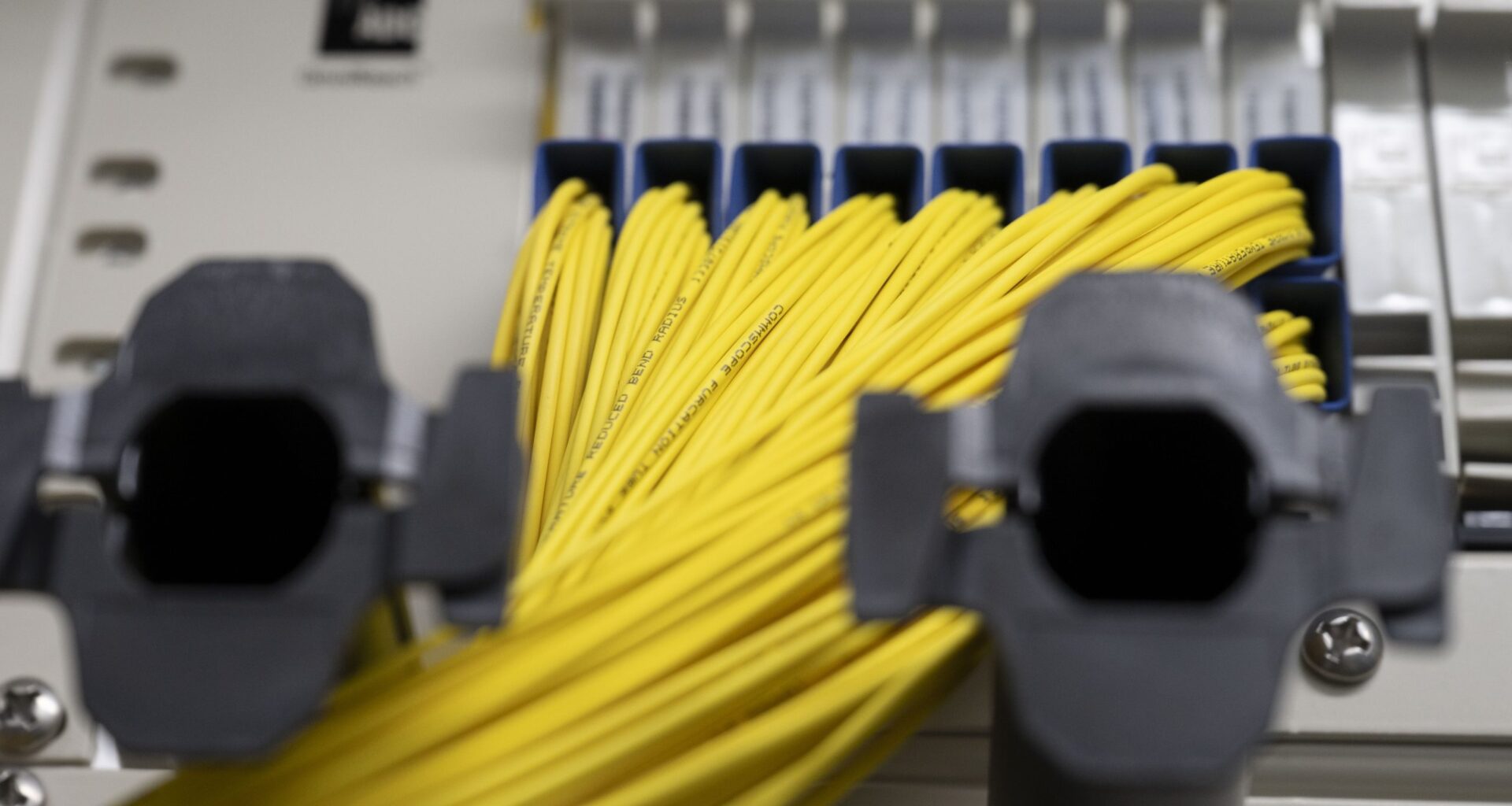Almost 26 years into the new millennium, as most of the country gears up for an AI revolution, one in six Americans still lack access to high speed internet — a resource that could today be considered as vital and essential as water or roads.
Most of these internet deserts are in rural areas, and with less than 5 years of experience with broadband, how have the hilltowns seen the resource changing their lives?
It is a double-edged sword and a mixed blessing, say some. There is almost no aspect of life the change hasn’t touched, from education to health care, and from real estate sales to the way that business is done.
Among positive impacts, broadband has meant the capability remote learning and jobs, and telehealth care thanks to more than a decade of investment by the state and local communities.
But of course the miracle of the internet also carries with it unintended consequences, which includes less in person interaction and the potential of becoming addicted to screen time.
Developing Infrastructure
In just the past few years or more, the towns of Ashfield, Goshen, Plainfield, Windsor, Cummington, and Chesterfield have all been equipped with broadband that reaches more than 90% of residents in each of the communities. The positives have been almost as infinite as the internet itself for the towns that average 1,000 residents.
Dave Christopolis, executive Director of the Hilltown CDC, said that currently his job involves more emailing and Zooming than in his entire 15 years of holding the position which centers around developing affordable housing, connecting businesses to resources and broadening rural access to education and health services.
“Email has has just gotten more and more exponential in the past 20 years. It’s just like all day everyday email, it’s just constant. Hardly anyone phone calls these days,” he said. “Zooming has kind of replaced driving so it is just like emailing and zooming endlessly.”
For him the positive is is that he is able to do “twice as much work emailing and zooming as opposed to writing and driving.”
This is a stark contract to the pandemic days when the entire CDC office was thrust into remote work — an impossible task without access to high speed internet.
Back at the time, nothing could get done.
Christopolis still remembers the exact date of when the CDC had to close its doors thanks to the COVID-19 becoming part of our daily lives: March 19, 2020.
“Most people’s connections in their homes weren’t strong enough to be able to support a remote desktop connection,” he said. “I sat home for like two hours one day with a tech guy on my phone … I’m like look I need to run a $4 million non-profit from home for who knows how long, and I need access to my files.
“It just wouldn’t work” he said.
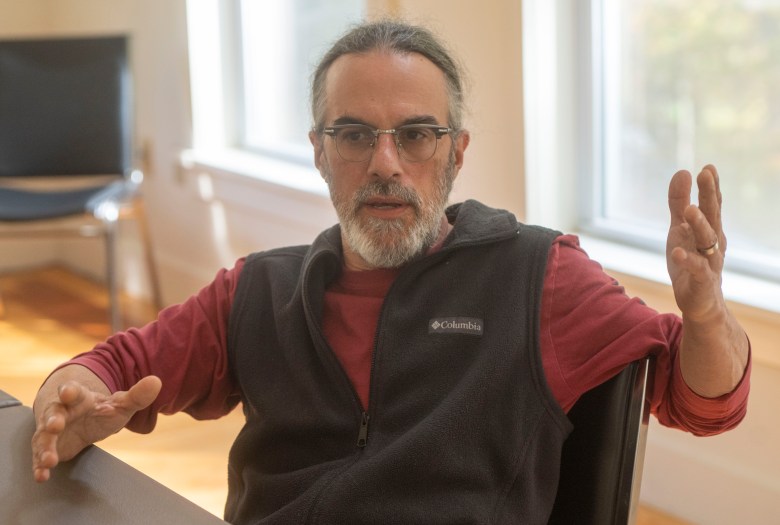 Dave Christopolis, the executive director of Hilltown CDC, talks about the impact of receiving Broadband internet connection for the rural Hilltowns. Staff Photo/Carol Lollis
Dave Christopolis, the executive director of Hilltown CDC, talks about the impact of receiving Broadband internet connection for the rural Hilltowns. Staff Photo/Carol Lollis
Christopolis also said that the hilltowns were at a disadvantage compared to other communities without having internet access other than the slow, expensive, “click click click” of dial-up from Verizon.
“It allows us to do more computing, and larger volumes. Files aren’t a problem — music, videos, architectural drawings,” he said. “Whereas before you had to compress them.”
Residents like Alex Simisky have had the same experience.
Simisky reminisced that when he moved to town Verizon was the main option. He also tried using a wireless hotspot but both had the same result: “It was very slow at that point.”
But implementing broadband has, “enabled people to do remote work and have access to things that they otherwise wouldn’t,” he said. “I was actually doing some work just now, uploading videos and doing all kinds of stuff.”
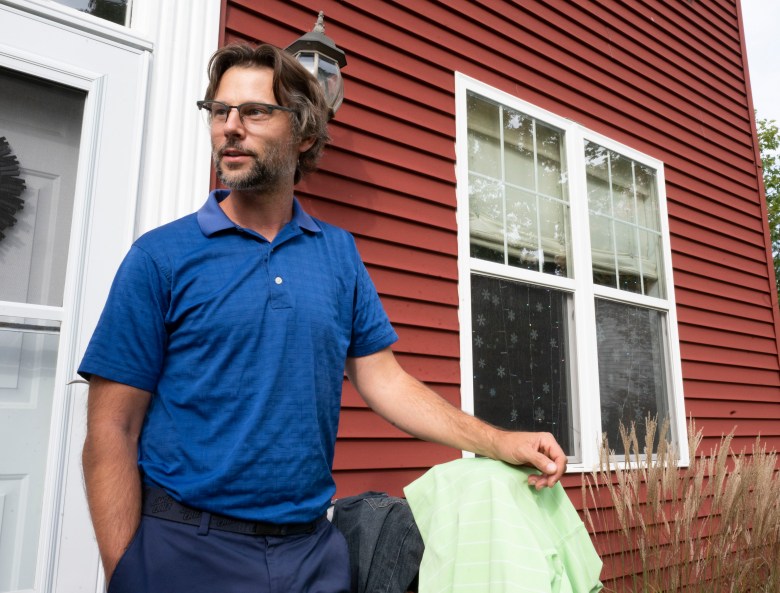 Alex Simisky, a resident of Chesterfield talks about how receiving Broadband internet connection has impacted his life in the Hilltowns. Staff Photo/Carol Lollis
Alex Simisky, a resident of Chesterfield talks about how receiving Broadband internet connection has impacted his life in the Hilltowns. Staff Photo/Carol Lollis
Several hilltown residents remembered times when parents would park outside of town halls or post offices, often under lamp posts due to the dark, just to get a wifi connection for their kids trying to do homework.
“And I think you know, if you’re a teenager, you’re not able to talk to your friends, you know you’re probably pissed and don’t want to live here, but that’s not the case anymore,” said Christopolis.
We were on an old country road and now we’re a fast highway
Brenda Lessard
And social media is slowly replacing newspapers as a preferred form of media.
“Now that we have broadband, people use their phones more than anything in our hilltowns — that’s how they get their information,” said Christopolis.
“You need it for democracy — there are so many reasons that the internet is important,” said Christopolis.
According to Chesterfield Town Administrator Brenda Lessard, before the implementation of high speed internet there weren’t too many houses being sold in town. But that has changed.
“It’s become a more desirable place to buy a home because of broadband. It’s opened up a whole new world for people to buy,” she said. “We were on an old country road and now we’re a fast highway.”
During covid when many medical and banking transactions were being done over the phone, she said it was difficult for people before the town’s fiber optic internet was installed.
But times have changed.
“Prior to broadband our electronic medical record, EMR, was very prone to outages,” said Michael Purdy, the CEO of the Hilltown Community Health Center (HCHC) in Worthington. “This was very disruptive to patient care, as everything from scheduling patients, phone messages, specialist correspondence, and treatment plans needed to be documented in our EMR.”
“With broadband those outages seem like a distance memory. Fortunately, we did have broadband by the time the pandemic hit, and we were able to implement tele-health visits,” he said.
In 2025, over 90% of the health center’s behavioral health visits occur online via telehealth technology. An immense progression given the fact that the HCHC was founded in 1950 by Florence Bates, a nurse who would go around on horseback.
And the changes have also enhanced leisure time.
Resident Dee Cinner hasn’t been to a movie theater in years, partially thanks to the fact that she was able to get streaming services, like Hulu, to watch her favorite flicks. For her, that means Christian Bale movies.
She noticed the life changing positives within six to seven months after Broadband was implemented, she said.
“My overall stress in my life had gone down 35%” over the course of that time, she said. “It was fabulous, not messing around with connections, using your data.”
Volunteer involvement
All the towns who with the state have upgraded to broadband have huts that are the “brains” of the hilltowns, explained Justin West who leads Chesterfield’s Municipal Light Board.
In Chesterfield, the hut is a reinforced concrete shed behind the post office. Here, data is sent out at the speed of light.
“Light is the fastest thing we know, so if you piggyback data off of light you can send as much as you want,” West said. “It’s limited only by equipment.”
Town light boards support the functioning of the broadband connection in addition to resources from Whip City Fiber and Westfield Gas and Electric which provide the internet connection in these towns.
When’s the last time Verizon called you up and said, ‘Hey, we’re reducing your rate by $10’
Justin West
Not only has internet been a modern convenience, the upgrade has also been convenient for the taxpayers pocketbooks. No taxpayer dollars have had to go into the Chesterfield system that cost more than $2 million.
Part of the costs were covered by several funding sources from the state.
When the infrastructure was being implemented in 2015, the town authorized $1.51 million to be borrowed to cover its end of the deal with the state.
By the end of the project, only $750,000 in town funds were needed and that has nearly been paid off by the revenue brought in by the 540 Chesterfield broadband subscribers.
And it’s not like people are paying a fortune.
Initially rates were posted at $85 a month. Last year they were lowered to $75.
One big reason for this is because West and Jack Henry, who is the financial manager of the Chesterfield Broadband network, don’t receive salaries for their work, but instead earn $6,000 annual stipends.
And the service is also better than what companies are able to offer.
Since each house is fed its own, personal line rather than sharing lines like Verizon and other companies do, internet doesn’t slow down, they said. Then there is also the fact that in Chesterfield there is no waiting on hold for help with internet troubles.
“It’s 24/7” said West. “A subscriber can call you up at any time — say an elderly person saying ‘my broadband is not working’ We jump in the car and and go there and fix it for them.’”
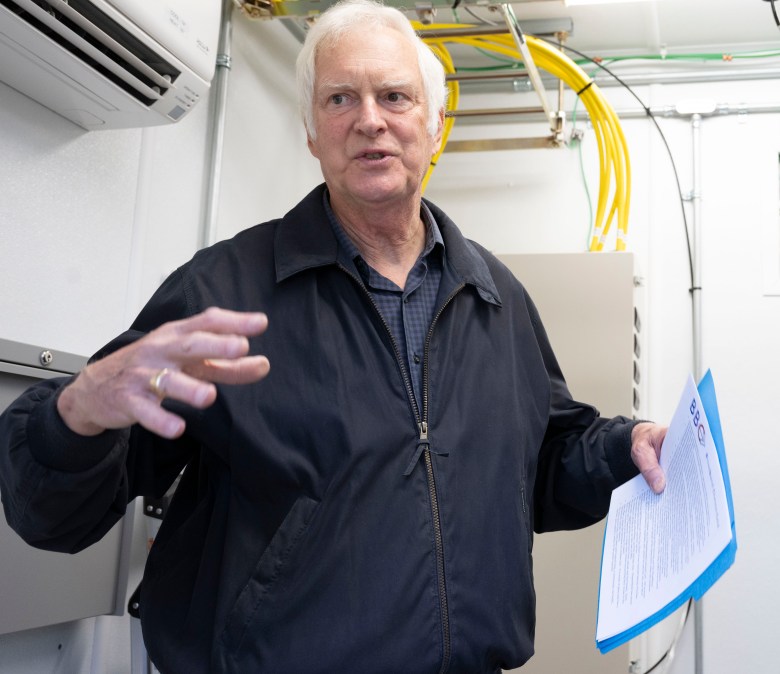 Justin West the general manager for Broadband Chesterfield, explains the fiber optics network supplying broadband internet to the residents of Chesterfield. Staff Photo/Carol Lollis
Justin West the general manager for Broadband Chesterfield, explains the fiber optics network supplying broadband internet to the residents of Chesterfield. Staff Photo/Carol Lollis
West has a livestream of everything occurring in around the hut, and also tracks its internal temperature because the system is prone to overheating. So much so, that the space is often air conditioned in the winter time, he said.
And neither West or Henry were born into their positions. West started out as a painter and became a professor at Holyoke Community specializing in digital media. Henry spent his career running the human resources department for Big Y supermarkets.
“The bottom line is that you’ve got a small town in rural Massachusetts who with volunteers and a good community have assembled a utility on the scale of electricity and telephone for their town that they own and control at a reasonable cost,” West said. “And when’s the last time Verizon called you up and said, ‘Hey, we’re reducing your rate by $10.’”
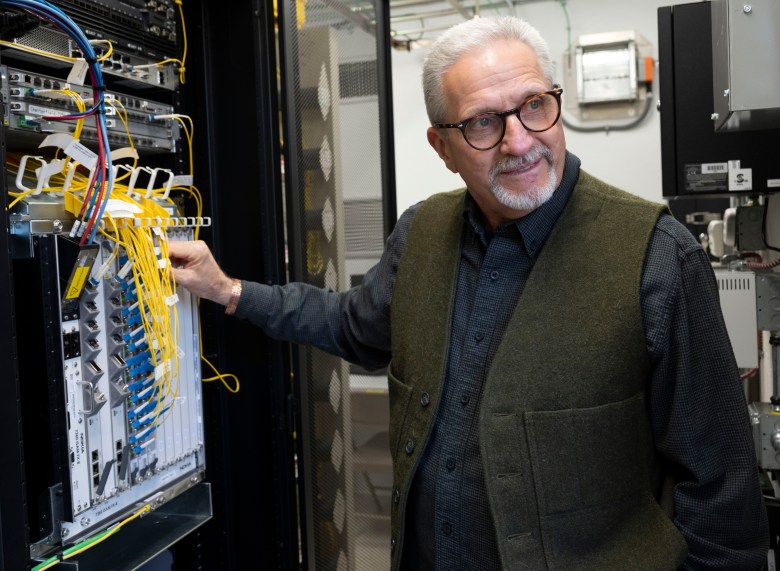 Jack Henry, the financial manager for Broadband Chesterfield, explains the fiber optics network supplying broadband internet to the residents of Chesterfield. Staff Photo/Carol Lollis
Jack Henry, the financial manager for Broadband Chesterfield, explains the fiber optics network supplying broadband internet to the residents of Chesterfield. Staff Photo/Carol Lollis
Cons
Goshen resident Bob Raymond said internet access “drew us into the 21st century” — with the mixed bag of good and bad that comes with it.
Calling broadband access a “double-edged sword,” he said that the internet has a way of “shedding light on the darkness.”
Despite Christopolis’ enthusiasm for what broadband has done for the community, he is also aware of the negative affects it has had on him personally.
“I’m the first person who would not want to be on their too long, but I find myself going on there because it’s so seductive. It’s easy and convenient. It’s easier than holding a newspaper — it’s so easy to read that stupid thing,” he said. “There’s probably a lot of that going on with kids.”
Christopolis continued, “I’m not sure. I don’t have evidence, but its happening to me. I’m trying to curb my own behavior because it’s driving me crazy. And the thing is, you can’t work without one.”
He’s not the only one who can’t unglue himself come the end of the work day.
“I spend so much time on computers,” said Lessard, Chesterfield’s town administrator. “So I go home and I find myself picking up my phone and I play games or I’m online, or checking Facebook.”
She is in the group of people believing that broadband has been both a “blessing and a curse.”
“It’s a blessing and a curse all at once because I do think that we rely too heavily on the internet. People go there to get their news — it’s like nothing can happen for five minutes and people have to know,” she said. “What happened to the days when we used to have to wait until the newspaper was published and read about it in the paper?”
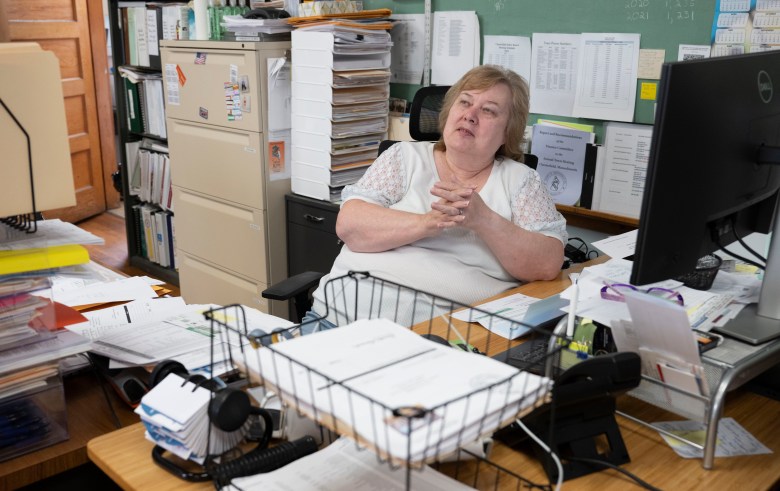 Brenda Lessard, the Chesterfield Town Administrator, talks about how receiving Broadband internet connection has impacted rural life in the Hilltowns. Staff Photo/Carol Lollis
Brenda Lessard, the Chesterfield Town Administrator, talks about how receiving Broadband internet connection has impacted rural life in the Hilltowns. Staff Photo/Carol Lollis
Another new thing is that scams have increased. She also feels lukewarm about having all her files digitalized despite the convenience.
Lessard, who is also town clerk in Williamsburg, said all of her files are now digital with the exception of marriage certificates. This makes it easier for residents to pay their bills to the town or conduct business though at the cost of less social interaction in the town’s public square.
“All our documents are backed up digitally which is a good thing for our files. I love the broadband here,” she said.
However, “All these interactions used to be done on paper, like paying bills … So I think it’s taken away from a lot of the face to face interactions that you used to have,” she said.
She said the number of people doing business online is, “a stark contrast to what it was just a few years ago.”
What to Read Next

